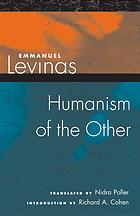










In Humanism of the Other Emmanuel Levinas argues that it is not only possible but of the highest importance to understand one's humanity through the humanity of others. Based in a new appreciation for ethics, and taking new departures from the phenomenology of Hegel, Heidegger, Husserl, and Merleau-Ponty, the idealism of Plato and Kant, and the skepticism of Nietzsche and Blanchot, Levinas rehabilitates humanism and restores its promises." "Painfully aware of the long history of dehumanization that reached its apotheosis in Hitler and Nazism, Levinas does not underestimate the difficulty of reconciling oneself with another. We find our humanity, Levinas argues, not through mathematics, rational metaphysics, or introspection. Rather, it is found in the recognition that the suffering and mortality of others are the obligations and morality of the self."--BOOK JACKET.
Read more...

